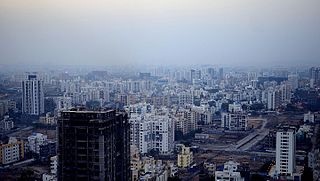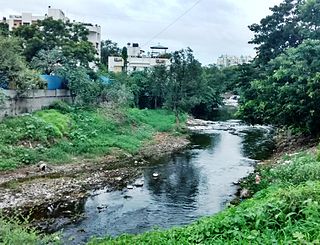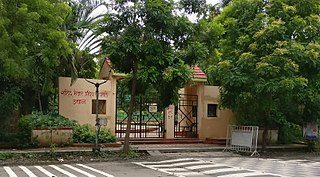
Pimpri-Chinchwad, also known as "PCMC", is a city in the Indian state of Maharashtra. The city is about 15 km (9.3 mi) northwest of the historic city of Pune, at an altitude of 590 m (1,940 ft) above sea level. It is the fifth largest city in Maharashtra and the nineteenth largest city in India and the sixteenth largest satellite city in the world by population. The city is located 135 km (84 mi) southeast from the state's capital Mumbai. It is one of the most rapidly developing suburban areas in India and has emerged as the third fastest growing city in the country. It is well known for its automotive, IT and manufacturing industry.

Pune district is a district in Western Maharashtra with Administrative Headquarters in Pune city. Pune district is the most populous district in the Indian state of Maharashtra. It is one of the most industrialised districts in India.

Kothrud is an upmarket residential neighborhood in the city of Pune.

Bhadravati is a city and a municipal council in Chandrapur district in the state of Maharashtra, India. It lies 26 km from Chandrapur city. Bhadravati city has recently bagged the Best City in 'Innovation & Best Practices' award under the population Category - 50K to 1 Lakh from the Government of India under Swach Surverkshan Awards-2021. It has also bagged 8th Rank in being the cleanest city under category population Category - 50K to 1 Lakh under Swach Surverkshan Awards-2021 amongst 132 cities nominated.

Pune Municipal Corporation (PMC) is the civic body that governs the inner limits of Pune, India. It is in charge of the civic needs and infrastructure of the metropolis, which is spread over an area of 500 sq. km. and has 3.4 million residents. Established on 15 February 1950, the executive power of the PMC is vested in the Municipal Commissioner, an Indian Administrative Service (IAS) officer appointed by the Government of Maharashtra. The position is held by Dr. Rajendra Bhosale, IAS.The general body of the PMC consists of 162 directly elected councilors, popularly known as "corporators", headed by a mayor. Murlidhar Mohol (BJP) was elected as the mayor and Sunita Wadekar as the deputy mayor by the newly elected in April 2021. The land for Pune Municipal Corporation was donated by Late Hon. Shri. Bhausaheb Shirole (Patil) who was second Mayor of Pune city and later became an MLC.
The Ahobila Matam is a Vadakalai Sri Vaishnava monastery established around 1400 CE at Ahobilam in Andhra Pradesh, India following the Vadakalai tradition of Vedanta Desika. It is attributed to Sri Adivan Satakopa Swami.
Shivam Road is a major commercial and residential area in Amberpet, Hyderabad, Telangana, India. This area is named after the Shivam Temple which houses a large shiva lingam, with the foundation stone laid by Satya Sai Baba.
Warje is a suburb of Pune, in the Indian state of Maharashtra. A former village, it was incorporated into the city in 2001.

Balewadi is a residential suburban town of Pune, located in the city's Western Metropolitan Corridor. It is famous for the Shree Shiv Chhatrapati Sports Complex which had hosted both the National Games in 1994 and the 2008 Commonwealth Youth Games. The complex had also hosted the second edition of Khelo India Youth Games, which kicked off on 9 January 2019.
Balaji Mandir is a well-known Indian temple and landmark in Pashan, Pune. It was built by the Ahobila Mutt.

Shivajinagar is an inner suburb of the city of Pune, India.

Parvati Hill is a hillock in Pune, India. The hillock rises to 2,100 feet (640 m) above sea level. Atop the hillock is the Parvati Temple, one of the most scenic locations in Pune. The temple is the oldest heritage structure in Pune and was built during the rule of the Peshwa dynasty. For visitors, Parvati hill is also an observation point that offers a panoramic view of Pune. It is the second highest point in Pune. The hill has 108 steps leading to the top of the hill where the temple is situated. The hill was owned by the Patil named Taware. Peshwa purchased the hill to build a temple of Shiva. The Devi temple was believed to be of Taware's kulswami whose angara was able to cure a leg ailment of Kashibai, mother of Peshwa Balaji Baji Rao. Thereafter, the Peshwa built a temple complex there.

Ramnadi is a river in Pune District and is a tributary of Mula. It originates in the Sahyadris near Kathpewadi, north-west of Pune city. The river flows through the Bhugaon, Bhukum, Bavdhan, Pashan, Baner and Aundh areas of Pune city. It is defined as a brook by the Pune Municipal Corporation (PMC).

Baner is a suburb in the Western Metropolitan Corridor of Pune, India. Baner is well known for "Varkari" Parampara and Bhakti Aradhana from many years. Baner is bordered by Pashan in south, Balewadi to the west, Aundh to the north and Pune University to the east.

The Baner-Pashan Biodiversity Park is a proposed 200 hectare protected region currently under development in the Baner and Pashan suburbs of Pune, India by the Pune Municipal Corporation. The park is being constructed to protect the biodiversity near and around the Baner Hill and its spur, the Pashan Hill.

Shahid Major Pradeep Tathawade Udyan (or Major Tathawade Garden) is a public garden and a major landmark in Pune, Maharashtra, India. The garden was opened to the public on 31 October 2002 and is maintained by the Garden department of Pune Municipal Corporation.

Pashan Lake is an artificial lake near the suburb of Pashan, about 12 km from the city center of Pune, India. The lake was built in the British era to accommodate the water requirement of the neighbourhood. The main inlet of the lake is a small river (Ramnadi), which is even controlled by the barrage located to the north of the lake. The river originates from Bavdhan and flows via Pashan, Sutarwadi, Baner to Someshwarwadi before flowing into the main Mula river. Pashan lake has a total catchment area of 40 square kilometres (15 sq mi), and serves as a source of water to the old Pashan village, and the governor's residence, as well. Recent urbanisation around the lake has led to the fall in the quality of the water.
Bavdhan is a residential suburb, situated in the southwestern part of Pune, in the Indian state of Maharashtra.

Rainbow BRTS is a bus rapid transit system in the city of Pune. The system is operated by the Pune Mahanagar Parivahan Mahamandal Limited (PMPML). The infrastructure has been developed by the Pune Municipal Corporation & Pimpri Chinchwad Municipal Corporation, Pune. The project currently envisages 113 km of dedicated bus corridors along with buses, bus stations, terminals and intelligent transit management system.



















